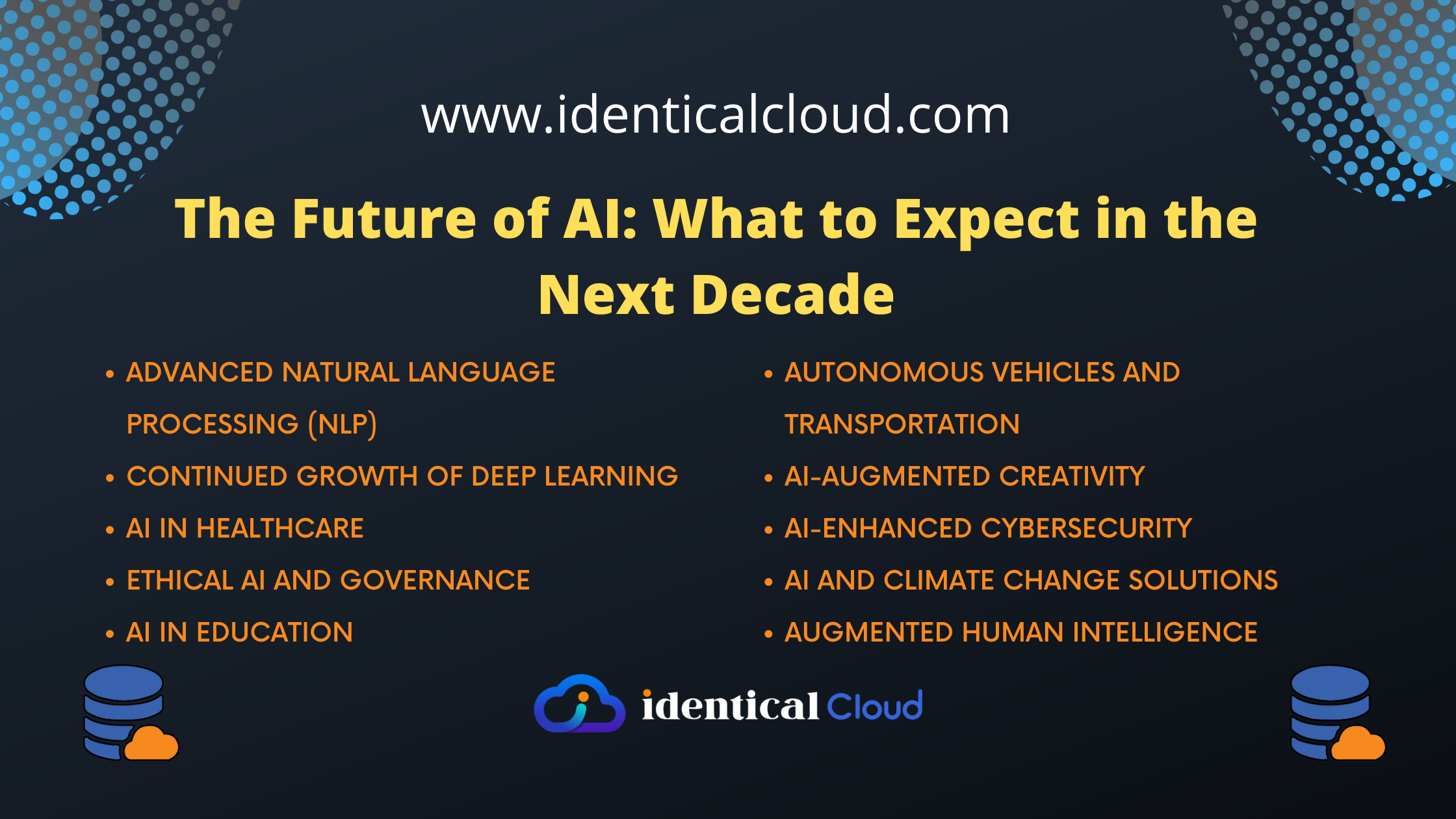
The Future of AI: What to Expect in the Next Decade
The Future of AI: What to Expect in the Next Decade
Artificial intelligence (AI) is rapidly evolving, and it is difficult to predict what the future holds. However, there are some trends that suggest that AI will have a profound impact on our lives in the next decade.
One of the most significant trends is the increasing use of AI in healthcare. AI-powered tools are already being used to diagnose diseases, develop new treatments, and personalize care. In the next decade, we can expect to see even more widespread use of AI in healthcare, leading to better outcomes for patients.
Another major trend is the development of autonomous vehicles. Self-driving cars are already being tested on public roads, and they are expected to become commercially available in the next few years. Autonomous vehicles have the potential to revolutionize transportation, making it safer, more efficient, and more accessible.
AI is also being used to develop new products and services. For example, AI-powered chatbots are being used to provide customer service, and AI-powered personal assistants are being used to help people with their everyday tasks. In the next decade, we can expect to see even more innovative applications of AI in the consumer space.
Of course, there are also some potential risks associated with AI. For example, AI could be used to create autonomous weapons that could kill without human intervention. It is important to carefully consider these risks as AI continues to develop.
Overall, the future of AI is very promising. AI has the potential to improve our lives in many ways, but it is important to use it responsibly. With careful planning and oversight, AI can help us create a better future for everyone.
Here are some additional things to consider about the future of AI:
- AI will become more integrated into our lives. We will see AI-powered devices and services in more and more places, from our homes to our workplaces to our cars.
- AI will become more powerful. AI algorithms will become more complex and sophisticated, allowing them to perform more tasks and make more accurate decisions.
- AI will become more affordable. The cost of AI technology will continue to decrease, making it more accessible to businesses and individuals.
As AI becomes more powerful and affordable, it is important to consider the ethical implications of its use. We need to ensure that AI is used in a responsible way that benefits all of society.
Here, we will explore some key developments and trends that we can expect in the next ten years.
1. Advanced Natural Language Processing (NLP)
NLP, the technology that enables machines to understand and interpret human language, will see significant advancements. AI language models will become more sophisticated, capable of understanding context, emotions, and even subtle nuances in communication, making human-computer interactions more natural and seamless.
2. Continued Growth of Deep Learning
Deep Learning, a subset of AI that involves training artificial neural networks, will continue to be a driving force behind AI breakthroughs. With increasing computing power and access to vast amounts of data, deep learning models will become even more powerful and capable of tackling complex problems in diverse domains.
3. AI in Healthcare
The healthcare industry will witness a profound transformation due to AI applications. From diagnosing diseases more accurately and rapidly to personalized treatment plans and drug discovery, AI will revolutionize patient care and improve overall healthcare outcomes.
4. Ethical AI and Governance
As AI becomes more pervasive, concerns about ethics, bias, and privacy will gain prominence. In the next decade, we can expect increased efforts to develop robust ethical frameworks and governance models to ensure AI technologies are used responsibly and for the benefit of humanity.
5. AI in Education
AI will play a vital role in shaping the future of education. Personalized learning experiences, AI-powered tutoring systems, and intelligent assessments will help cater to individual student needs, enhancing the overall learning process.
6. Autonomous Vehicles and Transportation
Advancements in AI will lead to further development and deployment of autonomous vehicles. In the next decade, we can anticipate safer and more efficient transportation systems, reduced traffic congestion, and enhanced mobility solutions.
7. AI-Augmented Creativity
AI will complement human creativity across various artistic domains. From music composition to visual arts, AI-powered tools will aid artists and creators in generating innovative and inspiring content.
8. AI-Enhanced Cybersecurity
With the growing threat of cyberattacks, AI will play a crucial role in bolstering cybersecurity. AI algorithms will analyze network behaviors in real-time, detect anomalies, and proactively defend against sophisticated cyber threats.
9. AI and Climate Change Solutions
AI will be instrumental in finding solutions to address the challenges posed by climate change. From optimizing energy consumption to analyzing environmental data, AI-powered technologies will contribute to a more sustainable future.
10. Augmented Human Intelligence
AI will augment human capabilities, leading to a new era of collaboration between humans and machines. Intelligent assistants will become even more adept at complementing human skills, amplifying productivity in various professional fields.
The future of AI is full of promise, but it is also important to be aware of the potential risks. By carefully considering the ethical implications of AI, we can help ensure that it is used for good.
